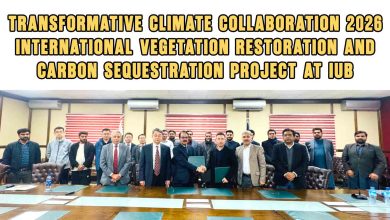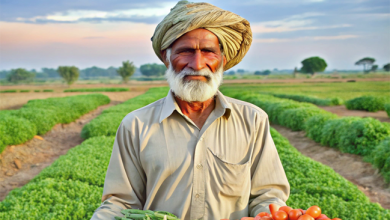The water crisis in Pakistan may need to be addressed urgently
- Pakistan is the sixth most populous country in the world, and it is estimated that by 2050, its population will reach 400 million. However, the country is facing a severe water crisis, and according to the Pakistan Council of Research in Water Resources (PCRWR), the country is on the verge of becoming a water-stressed country.
Although India has officially denied any intention to stop water flow to Pakistan and has maintained that it is abiding by the Indus Waters Treaty. However, some unofficial statements from Indian officials and analysts suggest that India may consider using water as a tool to put pressure on Pakistan. Past experiences show that water sharing between the two countries has been a contentious issue in the past, but disputes have been resolved through dialogue and mediation.
Water is one of the most vital resources for human beings and plays a crucial role in economic development, environmental sustainability, and social well-being. Unfortunately, Pakistan is facing a severe water crisis that threatens its economic growth, food security, and social stability. The crisis is mainly caused by a combination of factors such as climate change, population growth, and mismanagement of water resources. In this article, we will discuss the water crisis in Pakistan, its causes, and its impacts on the country’s economy, society, and environment.
Current Situation of Water Crisis in Pakistan
Pakistan is the sixth most populous country in the world, and it is estimated that by 2050, its population will reach 400 million. However, the country is facing a severe water crisis, and according to the Pakistan Council of Research in Water Resources (PCRWR), the country is on the verge of becoming a water-stressed country. Pakistan’s per capita water availability has declined from 5,260 cubic meters in 1951 to 1,017 cubic meters in 2021. The United Nations Development Program (UNDP) has ranked Pakistan at 80th out of 81 countries in terms of access to safe drinking water and sanitation.
Causes of Water Crisis in Pakistan
The water crisis in Pakistan is caused by a combination of factors, including climate change, population growth, and mismanagement of water resources.
Climate Change
Climate change is one of the significant causes of the water crisis in Pakistan. The country is vulnerable to the impacts of climate change, such as increased temperatures, melting glaciers, and erratic rainfall patterns. According to a study by the International Water Management Institute (IWMI), Pakistan’s average temperature has increased by 0.6°C over the past century, and it is projected to increase by 1-2°C by 2050. The melting of glaciers in the Himalayas and Karakoram ranges, which are the main sources of water for the Indus River, is another significant impact of climate change on Pakistan’s water resources.
Population Growth
Pakistan’s population is growing at a rate of 2.4% per year, which is among the highest in the world. The increasing population puts pressure on water resources as it increases the demand for water for domestic, industrial, and agricultural use. The increasing demand for water is further exacerbated by the fact that Pakistan’s agriculture sector is the largest consumer of water, accounting for 93% of the country’s total water usage.
Mismanagement of Water Resources
The mismanagement of water resources is another significant cause of the water crisis in Pakistan. The country has a poor irrigation system that leads to water wastage and inefficient water use. The canal system, which is used to distribute water to agricultural lands, is old and in a state of disrepair. The lack of proper maintenance of the canal system leads to water losses and inefficient use of water.
Impacts of Water Crisis in Pakistan
- The water crisis in Pakistan has severe impacts on the country’s economy, society, and environment.
Economic Impacts
The water crisis has severe economic impacts on Pakistan’s economy. The country’s agriculture sector, which is the backbone of its economy, is severely affected by the water crisis. The lack of water for irrigation leads to crop failures, reduced yields, and lower agricultural productivity. This, in turn, leads to lower incomes for farmers and increased food insecurity for the population. The industrial sector is also affected by the water crisis, as the lack of water leads to reduced industrial output and increased costs for businesses.
Social Impacts
The water crisis in Pakistan has had a significant social impact, affecting public health, agriculture, and migration, education, and gender inequality. Addressing this crisis will require a coordinated effort from government, civil society, and the private sector to ensure access to clean and safe water for all Pakistanis.
Recommendations
The water crisis is a serious issue in Pakistan, and solving it requires a comprehensive and multifaceted approach. Here are some practical, doable, and economically viable recommendations to overcome the water crisis in Pakistan:
Water Conservation: Pakistan needs to adopt a culture of water conservation. This can be achieved by promoting the use of water-saving devices such as low-flow showerheads, faucets, and toilets. Farmers can also be encouraged to use drip irrigation, which is more efficient and uses less water.
Rainwater Harvesting: Pakistan can also benefit from rainwater harvesting techniques, which can capture rainwater and use it for various purposes. This can be done by constructing small ponds, dams, and other storage systems that can hold the water for later use.
Efficient Use of Water Resources: Pakistan must utilize its water resources in the most efficient manner. This can be achieved by promoting the use of modern irrigation techniques, such as laser leveling and precision farming. The government can also invest in water-efficient technologies that can help farmers optimize their water usage.
Education and Awareness: Education and awareness campaigns can help create a culture of water conservation in Pakistan. This can be done by promoting the benefits of water conservation and highlighting the consequences of water wastage.
Desalination: Pakistan can also benefit from desalination technologies, which can convert seawater into freshwater. This can be particularly useful in coastal areas where freshwater resources are scarce.
Water Recycling: Pakistan can also benefit from water recycling technologies that can treat wastewater and make it safe for reuse. This can be particularly useful in urban areas where wastewater can be a significant source of pollution.
Public-Private Partnerships: The government can also encourage public-private partnerships to address the water crisis in Pakistan. Private companies can invest in water-saving technologies, water recycling, and desalination plants, while the government can provide incentives such as tax breaks and subsidies.
Water Governance: The water governance system in Pakistan needs to be reformed to ensure effective management of water resources. This can be achieved by strengthening institutions such as the Indus River System Authority (IRSA), improving water accounting and monitoring, and involving local communities in water management.
Pakistan can overcome the water crisis by adopting a comprehensive and multifaceted approach that includes water conservation, rainwater harvesting, efficient use of water resources, education and awareness, desalination, water recycling, rainwater harvesting in agriculture, public-private partnerships, and water governance reform. By implementing these recommendations, Pakistan can secure its water resources for future generations.
It is urged that the rulers may spare time to address water issues, especially with India. Leaving the internal tussles aside, need to settle the water disputes with India immediately. India evil-intensions are scaring and may deprive Pakistan from its due share of water. It will be disastrous and our several generations may be victimized. Next year is an Election year in India, and Narendra Modi may use all cards to gain public support in Elections to win another term of Prime Minister-ship.
Author: Prof. Engr. Zamir Ahmed Awan, Founding Chair GSRRA, Sinologist (ex-Diplomat), Editor, Analyst, and Non-Resident Fellow of CCG (Center for China and Globalization). (E-mail: awanzamir@yahoo.com).
The views expressed in the article are the author’s own and do not necessarily reflect the editorial policy of Global Village Space.







